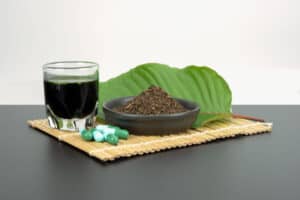Which Kratom Strains Are Helpful in Managing Anxiety/Depression?
There has been quite an interest recently in the use of Kratom to help with treatment of depression. Is this really a useful product, and is there any evidence that it will help those who suffer from depression? Let’s take a look at the evidence and more importantly check whether there are any side-effects.
There may be recommended product links in this post. If you click one of these links and buy, the small commission I recieve will help support me run this with depression. Thank you!
Before looking at the details, what exactly is Kratom anyway?
Kratom is a natural product made from the leaves of a tree which grows in S.E.Asia. It has been used as a natural medicine in that area for many years. Kratom acts a stimulant and at lower dosage boosts energy. At higher doses, it causes sleepiness. There are some concerns it could be addictive, though many doctors say it requires further research and may be beneficial.
Source: WebMD

Symptoms of and Treatments for Anxiety
- Nervousness all over the body
- Difficulty getting regular tasks done
These are just a handful of symptoms of anxiety. They can vary from one person to another.
A variety of treatments are designed to manage anxiety such as medication, behavioral therapies, meditation, lifestyle changes, and a healthy diet. Not all methods work on everyone. Some respond better to a few of those than others.
Herbal Treatments for Anxiety and Depression
In terms of herbalism, we have herbs like Ashwagandha, Kava Kava Root, St. John’s Wort, Brahmi, etc that can manage anxiety symptoms. Kratom is another herb (it’s a tropical tree) which is a new addition to this field. In fact, the herb is gaining quite a lot of popularity for managing anxiety, depression, PTSD – and several other mental health disorders effectively.
Some strains of Kratom may be helpful to people who suffer from anxiety, stress, and depression. According to HealthOnline.com, there is evidence to show it is effective but more research is necessary.
While being occasionally anxious seems like a part of life and stress in small amounts can actually keep you going, persistent anxiety and stress when left unchecked can become chronic and damaging.
The statistics related to anxiety are scary. For example, the Anxiety and Depression Association of America says that almost 18% of the population suffers from anxiety. Approximately 332 million people are currently living with depression.
Common signs of anxiety are –
- GERD or acid reflux
- Shortness of breath
- Panic attacks/anxiety attacks
- Heart palpitations
- Loss of Appetite
- Trouble falling asleep
- Heightened sensitivity to smell, light, and sound
Let’s look at how kratom manages anxiety:
How Does Kratom Work?
If you have done any research on kratom as a botanical, you will often see statements like, “kratom works much like opioids”. That is true in the sense that kratom binds to the same receptors in the brain as opioids do. To that end, kratom and opiates are similar in terms of mechanism. There is some concern, though, that people using kratom may become dependent on the drug. There are a number of potential withdrawal symptoms if it is used too much, some of these are listed here on the National Institute of Drug Abuse Website.
What exactly is an opioid? Here is a definition:
Opioids are substances that, when reaching opioid receptors, have effects similar to those of morphine. Medically they are primarily used for pain relief, including anesthesia.
Source: Wikipedia
In fact, in several cultures, kratom was used as a treatment for overcoming opioid addictions.
In one of the clinical mentions, we saw that antidepressants tend to interfere with REM sleep patterns. This can lead to sleep issues. But, kratom’s alkaloid action seems to offer relief from depression without interfering with the REM sleep.
Here’s another report that talks about kratom’s antidepressant-like nature. In the long term, it could come out as a promising harm-reduction and management tool. Kratom alkaloids like 7-hydroxymitragynine combined with its sedating effects may explain how kratom helps to manage anxiety.
While there’s not a ton of research on kratom, one review conducted in 2017 confirmed that many kratom users experience mood-elevation and relief from anxiety. The review also talked about a study performed on mice in which the kratom was shown to reduce levels of cortisol – the stress hormone.
However, in this author report published in the Addiction journal in 2008, although kratom can help with withdrawal symptoms from opioids, it can itself cause withdrawal symptoms after the treatment ends. So it is a mixed bag, this drug must be used with care and guidance.
Best Kratom for Anxiety & Depression
Kratom is a ‘variety’ botanical/herb. Meaning, it has a ton of varieties that go by the term ‘strains’. The strains differ based on where the plant was grown and harvested from, the color of the leaves and stem, their chemical structure, alkaloid profile, etc. Consequently, some strains are more effective than others.
If you’re not careful enough, some strains could worsen your anxiety, so you have to be careful.
Here’s a quick overview of which strains are best for anxiety –
#1 Malay Kratom
The Malay variety of kratom is seen as the finest one for inducing relaxation and calmness. The strain could alleviate many of the symptoms associated with depression and anxiety. They could also boost the mood and produce feelings of euphoria and a mild ‘high’ in an occasional user. Malay has been noticed to show effects like – better focus, mental clarity, and improved physical capacity.
It has a couple of varieties like – green, white, and red colored strain. But, the green one is the most popular for inducing relaxation and alleviating the symptoms of anxiety. You can check all three varieties at Kratom Crazy.
Malay kratom carries strong analgesic properties and it’s also mildly sedating which is a good combination for combating mental health issues.
#2 Borneo Kratom
Borneo kratom has a unique alkaloid profile. It is particularly high in 7-hydroxymitragynine – a potent alkaloid that has been linked to offering relief from anxiety and depression. The alkaloid is a known analgesic. Borneo has low amounts of mitragynine which makes it good for pain management and stimulation as well.
For best results, you should consume Borneo first thing in the morning to get yourself a good and positive start. You can also take it in the evening when it’s time to relax and unwind. It could put your mind to ease and induce feelings of relaxation. The effects could crossover into a deep, uninterrupted, quality sleep which is always a bonus point.
#3 Maeng Da Kratom
Maeng Da is, by far, one of the most popular and easily available strains in the market. It is one of the strongest varieties too. Most people consume it with the intention of managing pain, inducing relaxing, and for its stimulating effects. It has high levels of alkaloid ‘7-Hydroxymitragynine’ that has been linked with relief from anxiety and pain.
One thing you should know about Maeng Da is that it could have strong sedating effects. So, you need to be careful about the dosage and the timing.
Like other varieties, Maeng Da also comes in several varieties like – Green, White, and Red. Out of all 3, Red-vein is the most potent one while Green one is good for more energy and mood-elevation. Maeng Da is good for people who need relief from anxiety while also remaining productive throughout the day.
Final Thoughts
It’s unfortunate that despite being a potent herb with evidently a lot of therapeutic potential, we still lack in terms of research and clinical data to back up those claims. Kratom has also not been approved by the FDA. Nonetheless, its popularity continues to rise each year. Users are, however, advised to be careful about the quality and the initial dosing. Keep it as low as 3 grams to see how it impacts you before upping it.
Sources
- Boyer, E. W., Babu, K. M., Adkins, J. E., McCurdy, C. R., & Halpern, J. H. (2008). Self-treatment of opioid withdrawal using kratom (Mitragynia speciosa korth). Addiction (Abingdon, England), 103(6), 1048–1050. https://doi.org/10.1111/j.1360-0443.2008.02209.x
- Cheaha D, Keawpradub N, Sawangjaroen K, Phukpattaranont P, Kumarnsit E. Effects of an alkaloid-rich extract from Mitragyna speciosa leaves and fluoxetine on sleep profiles, EEG spectral frequency and ethanol withdrawal symptoms in rats. Phytomedicine. 2015;22(11):1000-1008. doi:10.1016/j.phymed.2015.07.008
- Kruegel, A. C., Uprety, R., Grinnell, S. G., Langreck, C., Pekarskaya, E. A., Le Rouzic, V., Ansonoff, M., Gassaway, M. M., Pintar, J. E., Pasternak, G. W., Javitch, J. A., Majumdar, S., & Sames, D. (2019). 7-Hydroxymitragynine Is an Active Metabolite of Mitragynine and a Key Mediator of Its Analgesic Effects. ACS central science, 5(6), 992–1001. https://doi.org/10.1021/acscentsci.9b00141
- Marc T. Swogger, Zach Walsh. 2018. Kratom use and mental health: A systematic review. Drug and Alcohol Dependence, Volume 183, Pages 134-140, ISSN 0376-8716, https://doi.org/10.1016/j.drugalcdep.2017.10.012. (http://www.sciencedirect.com/science/article/pii/S0376871617305586)
- National Institute On Drug Abuse. 2019. Accessed at https://www.drugabuse.gov/publications/drugfacts/kratom on 30 July 2020.
 Karl Perera is a fully qualified Life Coach, Teacher and Author of
Karl Perera is a fully qualified Life Coach, Teacher and Author of